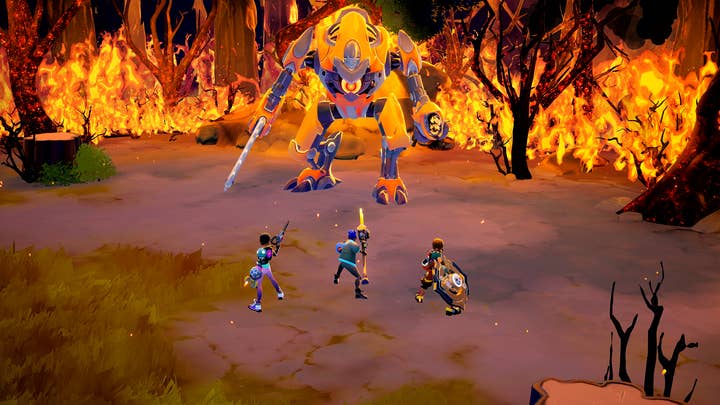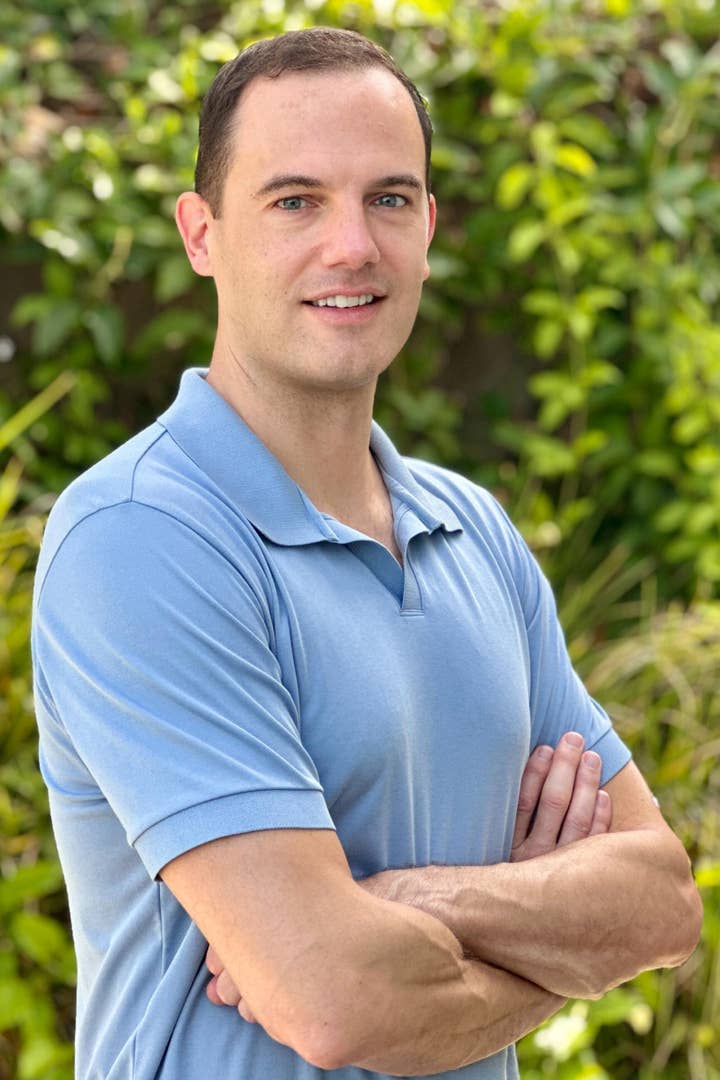
How Mike Morhaime’s Dreamhaven helps indies with “the good, bad and ugly” of launching games
In
2020,
Blizzard
co-founder
Mike
Morhaime
co-created
Dreamhaven,
a
new
developer
and
publisher
with
two
internal
studios
and
a
partnership
program
designed
to
help
other
indies.
Few
companies
can
survive
four
years
without
announcing
or
releasing
a
product,
but
the
funding
put
forward
by
Morhaime
and
his
wife
Amy
(also
a
co-founder),
as
well
as
external
investment
partners,
has
given
Dreamhaven
the
runway
to
fully
staff
up
its
publishing
team.
It
has
also
been
able
to
recruit
for
its
Moonshot
and
Secret
Door
studios,
both
of
which
are
led
by
former
Blizzard
developers.
There
are
now
100
people
across
all
of
Dreamhaven,
including
around
30
at
Secret
Door
and
just
over
50
at
Moonshot.
Yesterday,
Dreamhaven
announced
the
first
title
it
will
be
publishing
–
Lynked:
Banner
of
the
Spark
by
FuzzyBot
Games,
a
studio
that’s
been
part
of
the
company’s
partnership
program.
The
game
enters
Early
Access
on
Steam
on
October
22.
Meanwhile,
Secret
Door
is
on
course
to
announce
its
first
title
next
month
with
Moonshot
not
too
far
behind.
“We
would
have
loved
to
release
our
games
earlier,
had
they
been
ready,”
Morhaime
laughs.
“The
course
of
development
is
what
it
is
and
this
is
how
long
it
took.”

“Nobody
had
to
start
Dreamhaven.
Everybody
chose
to
do
this
because
it
allowed
them
to
focus
on
the
things
they
were
excited
to
focus
on”Mike
Morhaime,
Dreamhaven
Dreamhaven’s
partnership
program
involves
making
small
investments
in
each
studio,
but
also
offering
the
team’s
considerable
experience
in
an
advisory
capacity.
“We
have
a
lot
of
expertise,
not
only
in
our
publishing
capabilities
but
also
we
have
really
good
designers
that
could
potentially
just
jam
with
some
of
the
developers
in
our
partner
studios,
help
them
think
through
problems,”
Della
Bitta
explains.
“It’s
really
good
to
have
an
independent
person
in
your
discipline
to
talk
to.
Our
engineers
are
always
talking
together
about
challenges
that
they’re
facing.
“And
so
through
our
partnership
program,
we
actually
built
this
really
cool
community
of
independent
developers
that
can
share
knowledge,
talk
about
different
things
and
help
each
other,
because
we’re
all
in
various
stages
of
breaking
out
on
our
own
and
doing
something
new.”
Dreamhaven’s
main
goal
is
to
create
and
support
a
healthy
ecosystem
of
independent
developers,
whether
that’s
through
those
partnership
investments,
or
publishing
deals.
Morhaime
emphasises
that
studios
who
sign
up
to
Dreamhaven’s
partnership
program
are
not
then
obligated
to
use
its
publishing
services.
“In
fact,
we
want
to
help
them
find
the
best
possible
publishing
partner
that
they
could
find,”
he
says.
“It
doesn’t
have
to
be
us,
we
may
not
be
the
right
partner
in
a
lot
of
cases.”
He
continues:
“We’re
trying
to
create
win-win
relationships
with
all
of
our
partners.
The
way
the
publishing
deal
is
structured,
we
win
together
with
FuzzyBot.
There’s
not
going
to
be
a
situation
where
somehow
Dreamhaven
wins
and
FuzzyBot
loses.”

Image
credit:
Dreamhaven,
FuzzyBot
Paul
Della
Bitta,
who
leads
Dreamhaven’s
publishing
efforts,
adds:
“We
just
think
a
lot
of
the
innovation
that
we
see
–
either
new
IP
or
new
gameplay
or
new
genres
–
are
being
created
with
independent
developers.
And
we
think
that’s
really
important
for
our
industry
and
for
gamers
just
to
have
these
new
experiences.”
Dreamhaven
points
to
Lynked:
Banner
of
the
Spark
as
a
prime
example
of
this.
The
game
focuses
on
co-op
action,
but
also
involves
town
builder
elements
between
runs
–
a
combination
that
developer
FuzzyBot
hopes
will
help
the
title
stand
out.
FuzzyBot
was
first
formed
during
the
pandemic
by
a
group
of
former
Electronic
Arts
developers,
who
soon
grew
a
team
that
included
former
Assassin’s
Creed
and
Destiny
devs.
Seeking
to
build
something
different
from
the
AAA
blockbusters
they
were
used
to,
the
team
aimed
to
make
something
that
filled
a
gap
in
the
market.

“The
whole
process
gave
us
confidence
that
[Dreamhaven]
would
be
good
partners
through
the
good,
the
bad,
and
the
ugly
of
launching
a
game
these
days”Tatyana
Dyshlova,
FuzzyBot
Games
CEO
Tatyana
Dyshlova
tells
us
the
developer
noticed
that
most
cooperative
games
are
heavily
focused
on
action,
but
there
are
not
many
titles
that
appeal
to
less
hardcore
players.
“We
didn’t
have
a
lot
of
games
that
we
could
play
with
our
friends
and
family
that
weren’t
like
a
very
hardcore
shooter,
or
where
you
need
to
have
a
really
high
dexterity
with
a
controller,”
she
explains.
“Or
it
was
all
games
that
were
very
cosy
but
not
really
fun
if
you
like
action.
“So
we
wanted
to
create
a
game
that
[is]
like,
‘What
if
Animal
Crossing
had
a
lot
more
action?’
A
positive
place
to
hang
out,
to
have
different
types
of
experience
for
different
players,
and
that
would
facilitate
playing
together.”
An
action-packed
Animal
Crossing
certainly
sounds
like
it
should
stand
out
as
something
new,
but
in
a
market
that’s
increasingly
competitive
and
challenging
for
even
the
most
veteran
developers,
FuzzyBot
still
has
a
hard
road
ahead
of
it.
Dyshlova
acknowledges
this,
adding
that
trying
to
innovate
on
a
genre
is
particularly
tough.
“Being
the
first
one
to
try
something
is
always
challenging
because
the
players
don’t
have
a
great
reference,”
she
says.
“It’s
much
easier
to
say
‘it’s
this
meets
this.’
And
that’s
a
problem
that
we’re
constantly
iterating
on
with
Dreamhaven.
We
have
a
really
good
relationship
where
we
talk
about
this
daily,
so
that
does
really
help.
“The
market
is
what
it
is.
Our
approach
to
that
is
to
innovate
and
bring
something
fresh
and
hope
that
it
stands
out
–
albeit
with
the
continuous
challenge
[of]
actually
explaining
what
the
fresh
thing
is.”
With
so
many
indie
publishers
out
there,
we’re
curious
as
to
why
FuzzyBot
chose
to
go
with
Dreamhaven;
while
there
is
plenty
of
experience
among
its
team,
the
company
itself
remains
unproven.
Dyshlova
says
the
trust
earned
during
FuzzyBot’s
participation
in
the
partnership
program
was
a
key
factor.
“When
choosing
a
partner
to
bring
your
[game]
to
market,
I
always
find
that
it’s
the
people
that
are
much
more
important
than
a
brand
name
in
particular,”
she
says.
“What
Dreamhaven
provided
for
us
was
a
viable
future
for
the
studio
and
how
the
terms
were
presented
beyond
just
this
game.

“A
lot
of
the
innovation
that
we
see
–
new
IP,
gameplay
or
new
genres
–
is
created
with
independent
developers.
That’s
really
important
for
our
industry
and
for
gamers”Paul
Della
Bitta,
Dreamhaven
“Independent
developer
ecosystems
have
gone
through
ups
and
downs,
and
even
people
who
publish
successful
games
sometimes
don’t
make
it
just
because
of
their
contractual
obligations.
So
it’s
kind
of
echoing
back
to
the
purpose
that
Dreamhaven
presented
to
us,
which
is
to
support
a
healthy
ecosystem
of
game
developers
outside
of
some
of
the
big
conglomerates
who
can
bring
cool
innovative
games
to
market,
who
can
build
the
next
generation
of
game
developers.
That
came
across
both
on
paper
and
in
conversation.
“And
obviously
their
pedigree
is
really
impressive.
The
feedback
that
they
were
giving
us
early
on
was
really
balanced,
a
lot
of
really
good
constructive
criticism.
It
wasn’t
antagonistic
–
sometimes
people
like
to
put
you
on
the
hot
spot
to
see
how
you
react.
So
the
whole
process
and
our
relationship
with
them
gave
us
confidence
that
they
would
be
good
partners
through
the
good,
the
bad,
and
the
ugly
of
launching
a
game
these
days.”
On
Dreamhaven’s
part,
Della
Bitta
says
it
was
an
easy
decision
to
sign
Lynked,
having
seen
much
of
the
game
throughout
its
development
during
the
partnership
program.
“We
saw
the
velocity
that
the
team
was
working
at
and
it
was
really
impressive,”
he
says.
“And
so
it
was
a
natural
fit
for
us
because
we
knew
the
team,
we
got
along
really
well.
We
really
loved
what
they’re
making,
we
thought
what
they
were
making
fit
really
well
with
the
publishing
capabilities
that
we
were
building
too.”
He
continues:
“We
think
that
with
our
current
slate,
including
Lynked,
players
are
going
to
see
that
we’re
offering
really
fun
games
that
they
can
play
with
their
friends
that
are
unique,
providing
some
new
elements
of
gameplay,
like
Tatyana
was
describing.
We
don’t
want
to
chase
[fads],
we
don’t
want
to
just
offer
a
reskinned
take
on
something
that’s
out
there.”
Morhaime
concludes:
“Nobody
had
to
start
Dreamhaven,
everyone
had
other
options.
They
could
have
all
done
lots
of
different
things.
Everybody
chose
to
do
this
because
it
allowed
them
to
focus
on
the
things
they
were
excited
to
focus
on
in
partnership
with
other
really
talented,
experienced
people.”




